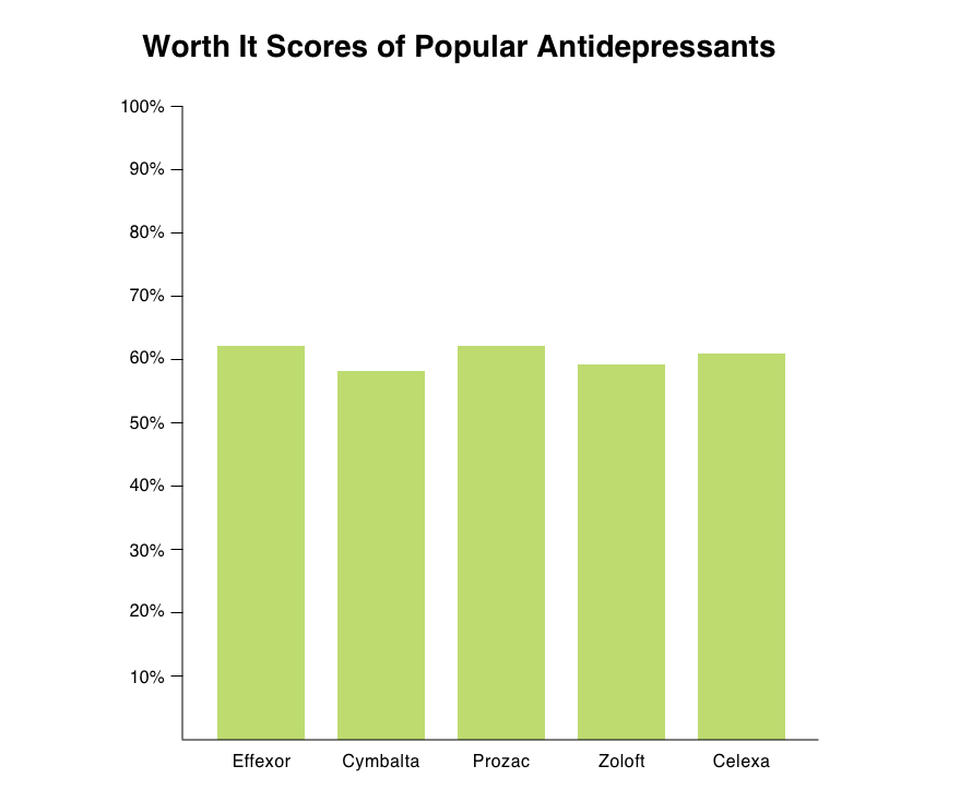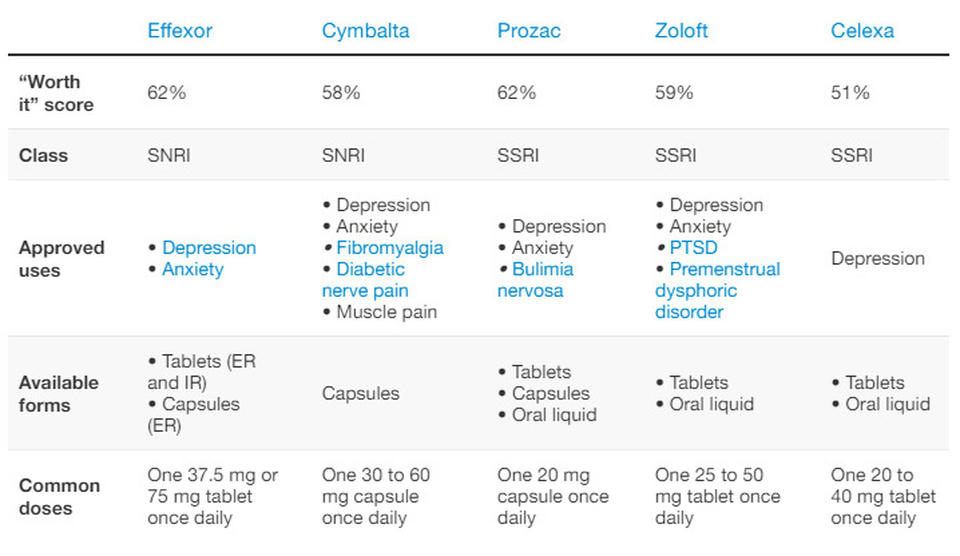What are the best antidepressants for anxiety and depression?
Key Takeaways:
1.In 4,000 consumer reviews, about 60% of people who tried Effexor (venlafaxine), Cymbalta (duloxetine), Prozac (fluoxetine), Zoloft (sertraline), or Celexa (citalopram) said the drugs were worth using.
2.The best antidepressant for anxiety and depression depends on a lot of personal factors, such as your symptoms, medical history, and tolerance for side effects.
3."Worth it" ratings are not a widely accepted way to rate a drug's effectiveness. They are for reference only. Data from clinical trials and other studies are a more reliable way to judge a drug's effectiveness.
With so many antidepressant drugs to choose from, finding one that works is often a long process. That's because the best antidepressant for anxiety and depression is different for everyone. In addition to your personal preferences, health experts use data and various clinical guidelines to try to find the best drug for your needs. However, the best match on paper isn't always the best match for you. It may take some trial and error to find the drug that works best for you. Since it's not always an exact science, sometimes it's good to hear about first-hand experiences with your choices. Here, we'll look at 4,000 reviews of five popular antidepressants -- Effexor (venlafaxine), Cymbalta (duloxetine), Prozac (fluoxetine), Zoloft (sertraline), and Celexa (citalopram) -- to see what some people have to say about their personal experiences with these drugs.
What is a "Worth It" Score?
Here, a "Worth It" score is how someone rates a drug. The "Worth It" scores below reflect how well each antidepressant worked for the reviewer. 0% is the worst score, and 100% is the best score.

All five antidepressants received "Worth It" ratings of about 60%, meaning that 60% of people who tried them said the drugs were worth it. Compared to the 80% ratings that heartburn medications sometimes receive, 60% seems low. But treating depression is tricky -- finding the best antidepressant for your patient often requires patience and perseverance.
Keep in mind: These ratings cannot predict how you will respond to these drugs. Everyone's body is unique and processes and responds to drugs differently. So if you try one of these drugs, your experience may be very different from what you read about in the reviews. The statistics we discuss here are just for your reference, to give you an idea of what other people are experiencing.
Effexor (venlafaxine)
Worth Rating: 62%
Effexor belongs to a class of drugs called serotonin and norepinephrine reuptake inhibitors (SNRIs). They can help improve symptoms of depression and anxiety by increasing levels of two chemicals in the brain, serotonin and norepinephrine. It comes in both immediate-release and extended-release (ER) versions. Extended-release drugs work longer in the body.
Common side effects of Effexor include nausea, drowsiness, dry mouth, and more.
Cymbalta (duloxetine)
Worth Rating: 58%
Like Effexor, Cymbalta is an SNRI. Cymbalta can treat depression and anxiety, as well as certain types of chronic pain. Possible side effects of Cymbalta include drowsiness, headaches, and gastrointestinal problems.
SNRIs, like Cymbalta, don't mix well with alcohol, and taking the two drugs at the same time can be dangerous. So even if you only drink occasionally, tell your healthcare provider and ask if this is an option for you. These alcohol-related risks also apply to the other drugs on this list.
Prozac (fluoxetine)
Worth it rating: 62%
Prozac is a selective serotonin reuptake inhibitor (SSRI), which means it treats depression and other mood disorders by boosting serotonin levels in the brain.
This drug carries a risk of several side effects—such as trouble sleeping, drowsiness, and stomach upset—but more than half of reviewers say it's worth it. All SNRIs and SSRIs, including Prozac, can also cause sexual side effects. The specific chances of experiencing sexual dysfunction vary by drug.
Zoloft (sertraline)
Worthiness rating: 59%
Zoloft is another SSRI antidepressant that also treats depression and certain types of anxiety. It causes side effects similar to Prozac. Some of these side effects go away after taking these drugs for a month, but others may last longer.
Celexa (citalopram)
Worthiness rating: 61%
Celexa is another SSRI drug that treats depression. But unlike the above drugs, it has not been approved by the FDA to treat certain types of anxiety.
Although reviews suggest that Celexa has fewer side effects than the above antidepressants, it may be risky for people with liver or heart disease to take Celexa. Other potential side effects of Celexa include risks such as sweating and palpitations.
How do drugs like Effexor, Cymbalta, and Zoloft compare?
"Worth It" Scores of Antidepressant Medications
Table describing different antidepressants and anxiety medications.

Which antidepressant is best at helping you feel happy?
While most people think Effexor and Prozac are more "worth it," that doesn't necessarily mean they are the best antidepressants. Each person's situation is too different to generalize a single antidepressant as the best choice.
Whether or not you decide to take one of these antidepressants, be honest with your healthcare provider about how you're feeling physically and mentally. Treatment for depression varies from person to person and may involve therapy, medication, or a combination of both. It may take some trial and error to find what works for you, but involving your healthcare provider can help you find it.
The Bottom Line
The "worth it" scores provided here may be informative. Of the approximately 4,000 reviews, 60% of reviewers who tried these antidepressants said they were worth it. Still, there are several factors to consider when starting an antidepressant or switching to a new one. Depending on your specific situation, your pharmacist and healthcare provider can help you find an antidepressant, if needed, that meets your specific preferences and needs.
